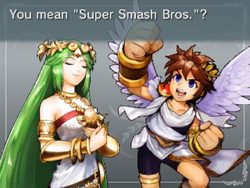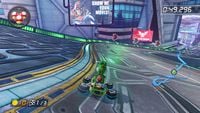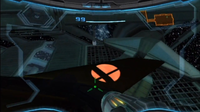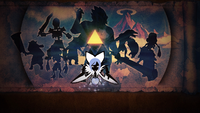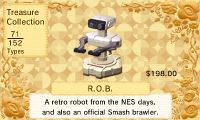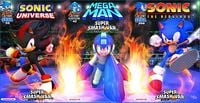List of Super Smash Bros. references in other franchises: Difference between revisions
From SmashWiki, the Super Smash Bros. wiki
Jump to navigationJump to search
(→Other franchises: The Chuunibyou light novels were never released in the West (but the anime has), so I'm going off Ultimatemegax's translations of the novels for the novel reference) |
|||
| Line 72: | Line 72: | ||
==Other franchises== | ==Other franchises== | ||
[[File:SmashArchie.jpg|thumb|Variant covers for ''Sonic Universe'', ''Mega Man'', and ''Sonic the Hedgehog'', combined to form its singular image.]] | [[File:SmashArchie.jpg|thumb|Variant covers for ''Sonic Universe'', ''Mega Man'', and ''Sonic the Hedgehog'', combined to form its singular image.]] | ||
*Sony's ''PlayStation All-Stars Battle Royale'' is their own counterpart to the ''Super Smash Bros.'' series, as it is also a crossover fighting game featuring several of Sony's own franchises. The game's development team stated that ''Smash Bros.'' itself was one of their inspirations and the title is a direct reference to the series' Japanese name, ''Nintendo All-Star! Great Melee Smash Brothers''. | *Sony's ''{{s|wikipedia|PlayStation All-Stars Battle Royale}}'' is their own counterpart to the ''Super Smash Bros.'' series, as it is also a crossover fighting game featuring several of Sony's own franchises as well as third-party characters from ''{{uv|Metal Gear}}'', [[Bandai Namco]] and [[Capcom]]. The game's development team stated that ''Smash Bros.'' itself was one of their inspirations and the title is a direct reference to the series' Japanese name, ''Nintendo All-Star! Great Melee Smash Brothers''. | ||
*Another counterpart to the ''Super Smash Bros.'' series is ''{{s|wikipedia|Cartoon Network: Punch Time Explosion}}'', featuring characters from several Cartoon Network shows. Several aspects from the ''Super Smash Bros.'' series, including the concept of [[Final Smashes]] and [[Assist Trophies]], are featured in the game. | *Another counterpart to the ''Super Smash Bros.'' series is ''{{s|wikipedia|Cartoon Network: Punch Time Explosion}}'', featuring characters from several Cartoon Network shows. Several aspects from the ''Super Smash Bros.'' series, including the concept of [[Final Smashes]] and [[Assist Trophies]], are featured in the game. | ||
* ''{{s|wikipedia|Dead Or Alive: Dimensions}}'', developed by {{s|wikipedia|Team Ninja}}, has | * ''{{s|wikipedia|Dead Or Alive: Dimensions}}'', developed by {{s|wikipedia|Team Ninja}}, has a [[Pyrosphere]] arena referencing the Ridley fight from ''Super Smash Bros. Brawl''{{'}}s Subspace Emissary, complete with Ridley scraping fighters along the walls of the arena; part of the reason for the stage's inclusion was because Team Ninja had previously collaborated with Nintendo for ''Metroid: Other M''. | ||
*As a promotion for ''[[Super Smash Bros. 4]]'', American comic book company {{s|wikipedia|Archie Comics}} announced that variant covers for Issue 69 of ''{{s|wikipedia|Sonic Universe}}'', Issue 42 of ''[[Mega Man | *As a promotion for ''[[Super Smash Bros. 4]]'', American comic book company {{s|wikipedia|Archie Comics}} announced that variant covers for Issue 69 of ''{{s|wikipedia|Sonic Universe}}'', Issue 42 of ''[[wikipedia:Mega Man (Archie Comics)|Mega Man]]'', and Issue 266 of ''[[wikipedia:Sonic the Hedgehog (comics)|Sonic the Hedgehog]]'' would feature a {{s|wikipedia|triptych}} based on ''Smash 4''. The three covers respectively feature [[Shadow the Hedgehog]], [[Mega Man]] using his down smash and [[Sonic the Hedgehog]] on a variant of the [[Boxing Ring]] stage, with the ''Mega Man'' cover also featuring [[wikipedia:Lenticular printing|a lenticular cover]] as to allow it to appear 3D. | ||
*''Super Smash Bros.'' is referenced in a sketch in | *''Super Smash Bros.'' is referenced in a sketch in the 11th episode of Season 3 of ''[[Wikipedia:Mad (TV series)|MAD]]'' called "Diary of a Wimpy Kid Icarus". Acting as a crossover between ''Super Smash Bros.'' and the children's book series ''{{s|wikipedia|Diary of a Wimpy Kid}}'', it featured several characters that from the ''Super Smash Bros.'' series, including Mega Man, and starred [[Pit]] and [[Kirby]] as unpopular high school students. At the end of the sketch, Pit and Kirby are challenged by Mega Man and his gang (comprised of Sonic, [[Pikachu]], and [[Donkey Kong]]) to a battle. The basketball court that they initially appeared on is then uprooted and flies high in the air, resembling ''Brawl''{{'}}s [[Battlefield]] without the platforms. As with a regular ''Super Smash Bros.'' match, a narrator counts down from "3" and the fight ensues. Pit wins the fight by firing a single arrow and earns his desired popularity. | ||
*[[File:TF2Damage.png|thumb|''TF2''{{'}}s version of the [[damage meter]], seen on the left]]The [https://wiki.teamfortress.com/wiki/Scream_Fortress_2014 sixth annual Scream Fortress Halloween | *[[File:TF2Damage.png|thumb|''TF2''{{'}}s version of the [[damage meter]], seen on the left]]The [https://wiki.teamfortress.com/wiki/Scream_Fortress_2014 sixth annual Scream Fortress Halloween event] for Valve Software's ''{{s|wikipedia|Team Fortress 2}}'' introduces a set of [https://wiki.teamfortress.com/wiki/Carnival_of_Carnage#Bumper_Cars bumper car mini-games] with damage mechanics that work identically to those in ''Smash Bros.'': players have a damage meter with a percentage that increases when hit and determines how much knockback they receive, with a major objective to knock the opponents out of the arena. | ||
*The two continuities of the ''{{s|wikipedia|Love, Chunibyo & Other Delusions}}'' franchise each have a different verbal mention of ''Super Smash Bros.'': | |||
**On pages 68-69 of the first volume of the light novel series, Yuuta and Rikka debate over the name of an otherwise unnamed video game, with Yuuta insisting that the game is called "Sumabura", an abbreviation of ''Smash Bros.'' | |||
**In the fifth episode of the first season of the anime, at the 7:40 time stamp, Yuuta compares Rikka's embarassment at having inferior math skills to her "servant" Dekomori to being up at 300% damage in ''Smash Bros.''. The words "Smash Bros." are partially bleeped out from the dialog for copyright reasons. | |||
[[Category:Lists]] | [[Category:Lists]] | ||
Revision as of 02:21, November 29, 2014
As the Super Smash Bros. series is a crossover of numerous existing Nintendo properties, some of the properties represented have since made references to the series in their "native" media. This is a list of all known references to Super Smash Bros. outside of the series itself.
Represented franchises
These are references from franchises directly represented in Smash.
Donkey Kong
- The opening theme to Melee, the Melee arrangement of Rainbow Cruise, and the Melee arrangement of the DK Rap are available tracks in the PAL release of Donkey Konga. The opening theme for Melee also appears in the Japan-only Donkey Konga 3: Tabehōdai! Haru Mogitate 50 Kyoku.
F-Zero
File:FZeroGPL Falcon Punch.png
Captain Falcon performs the Falcon Punch on Black Shadow in F-Zero: GP Legend.
- Captain Falcon used his Smash Bros.-originated Falcon Punch ability in the F-Zero: GP Legend anime, as seen in his final showdown against Black Shadow.
- While not performed in-game, the Falcon Punch was later referenced in a line from the credits music of F-Zero GX.
Fire Emblem
- A pack of downloadable missions in Fire Emblem: Awakening is entitled Smash Brethren, and pits Chrom in battles with two of Fire Emblem's three known Smash Bros. representatives at the time, Roy and Ike. The third - Marth - is absent in this pack, although he makes appearances in other downloadable missions, and his character is an important aspect of Awakening's mythos, with many characters referencing the character's backstory and personality and Lucina going under his name to hide her identity.
- RoyFireEmblemAwakening.jpg
Official artwork of Roy from Fire Emblem: Awakening.
- Ike DLC Kakusei Artwork.png
Official artwork of Ike from Fire Emblem: Awakening.
Official artwork of Marth from Fire Emblem: Awakening.
Kid Icarus
- Pit and Lady Palutena's appearances in Kid Icarus: Uprising are lifted directly from their designs in Super Smash Bros. Brawl. Pit's bifurcated bow from Brawl also appears in-game as the Bow-type weapon Palutena's Bow (in fact, all bow-type weapons can be split for melee attacks), and Dark Pit himself is based directly upon Pit's black palette swap from Brawl. In addition, multiple direct references are made to the Super Smash Bros. series in the game - Brawl itself in particular - as the game often breaks the fourth wall.
- In the Japanese version of the game, both Pit and Palutena stop in the middle of the tutorial to start up a copy of Brawl. The Brawl character select menu appears on-screen, with Pit choosing Mario and Palutena choosing Kirby. They decide against the idea before actually starting a match, however, and resume the tutorial.
- In the English version, the instruction of tapping the Circle Pad to dash makes Pit remark that the technique feels familiar. Palutena claims the technique is akin to a game called "Super Bash Sisters", before Pit corrects her, explicitly name-dropping the series as seen above.
- When using a Bow-type weapon, a conversation will sometimes start up where Pit mentions using a bow "in the last brawl" and that "it was a smash". Palutena claims she cannot imagine him "in a melee", to which Pit replies that he was not.
Kirby
- In Kirby 64: The Crystal Shards, when Kirby defeats a boss, he says "hi", using the same voice clip that Super Smash Bros. used one year prior. Kirby first said "hi" as his taunt in Smash Bros..
- In Kirby and the Amazing Mirror, both Master Hand and Crazy Hand make appearances as the bosses of the Candy Constellation area. Inhaling either of them will grant Kirby the Smash copy ability, which is a rough approximation of how he plays in the Super Smash Bros. series by pulling moves from other copy abilities that contributed to his Smash Bros. movesets. This move can also be obtained randomly by swallowing multiple enemies at once. Visually, Kirby is identical to his default non-ability appearance, as it is how he normally appears in Smash Bros.
- The ability returns in the Kirby's Dream Collection anniversary compilation, in two of the game's original challenge stages using the engine from Kirby's Return to Dream Land. These two stages are based entirely around navigation and combat with the ability, which is the only one available. The Super Smash Bros. logo can be seen on the background tiles of the stages.
- The visual design of the Fountain of Dreams stage in Melee was reused in Kirby Super Star Ultra, and its arrangement of the Gourmet Race theme was used in both Kirby: Nightmare in Dream Land and Kirby: Triple Deluxe.
Mario
- While arguably not explicitly references, several special moves invented for Melee have gone on to become used in Mario games:
- Before Melee, Yoshi had only been seen turning into an egg against his will or in response to a Super Star or Turbo Tulip. Upon the Egg Roll being introduced, self-egging became a staple ability of all Yoshis, seeing appearances in Mario Power Tennis and Mario Strikers Charged.
- Before Melee, Bowser had never used his shell as a weapon like other Koopas. With the introduction of the Whirling Fortress, shell maneuvers are now a common part of Bowser's arsenal, seeing use in Mario Power Tennis, Super Mario Galaxy 2, and Bowser's Inside Story.
- In the Spanish translation of Paper Mario: The Thousand-Year Door, one of Rawk Hawk's lines telling weaklings to "stick to video-game fighting" has been changed to "stay home playing Super Smash Bros. Melee". [1]
- Two of the Mystery House stages in Super Mario 3D World have the goal of defeating every enemy to advance; their English titles are Mystery House Melee and Mystery House Brawl.
- The Mario Kart 8 DLC pack The Legend of Zelda X Mario Kart 8 contains Mute City, a course based on the F-Zero series. A screen in that course depicts Captain Falcon alongside the quote "Show me your moves!", a line originating from his taunt in the Smash series.
Metal Gear
- In Metal Gear Solid: The Twin Snakes, the enhanced GameCube port of Metal Gear Solid, a character and boss in the game, Psycho Mantis, claims to have the ability to read minds. In addition to detecting the player's inputs and forcibly rumbling the player's controller, he will also comment on save data found in the same memory card; Psycho Mantis has unique dialogue if Melee's save data is detected.
Metroid
- In Metroid Prime 3: Corruption, bumper stickers can appear on Samus's Gunship depending on save data on the same Wii. If save data from Brawl is present, a sticker of the Super Smash Bros. logo can appear.
- In Metroid: Other M, one of Ridley's techniques is to replicate his wall scraping attack from his appearance in The Subspace Emissary.
- The Paralyzer was simply known as a "rather useless emergency pistol" in its debut in Metroid: Zero Mission. However, in Other M, it takes on the "Paralyzer" name from Brawl.
Pokémon
- An event distribution based on the Greninja that appears in Super Smash Bros. 4 will be available for Japanese players to download to Pokémon Omega Ruby and Alpha Sapphire via serial code if they register both that game and Super Smash Bros. for Nintendo 3DS with Club Nintendo during the end of 2014 into early 2015. The Greninja knows its four special moves from Smash, Water Shuriken, Shadow Sneak, Hydro Pump, and Substitute; it also has its rarer Hidden Ability, Protean. Its Original Trainer is named スマブラ (Smabura), an abbreviation of Smash Bros.
The Legend of Zelda
- The Zelda spinoff title Hyrule Warriors contains indirect references to Super Smash Bros. games:
- Princess Zelda's Special Technique when Focus Spirit is active involves using Nayru's Love, Farore's Wind, and Din's Fire in rapid succession. These spells from The Legend of Zelda: Ocarina of Time were used by Link in their original appearance, with Super Smash Bros. Melee being the first game to give these spells to Zelda.
- Ganondorf's Ocarina of Time incarnation appears in a cutscene describing Cia's backstory wielding his sword from the SpaceWorld 2000 GameCube Tech Demo. The only released game in which Ganondorf was shown using this sword in any capacity was Melee, where it appeared in his official artwork, one of his victory poses and his All-Star trophy.
Tomodachi
- R.O.B. appears as a treasure in Tomodachi Life; his description mentions his role as "an official Smash brawler".
Other franchises
- Sony's PlayStation All-Stars Battle Royale is their own counterpart to the Super Smash Bros. series, as it is also a crossover fighting game featuring several of Sony's own franchises as well as third-party characters from Metal Gear, Bandai Namco and Capcom. The game's development team stated that Smash Bros. itself was one of their inspirations and the title is a direct reference to the series' Japanese name, Nintendo All-Star! Great Melee Smash Brothers.
- Another counterpart to the Super Smash Bros. series is Cartoon Network: Punch Time Explosion, featuring characters from several Cartoon Network shows. Several aspects from the Super Smash Bros. series, including the concept of Final Smashes and Assist Trophies, are featured in the game.
- Dead Or Alive: Dimensions, developed by Team Ninja, has a Pyrosphere arena referencing the Ridley fight from Super Smash Bros. Brawl's Subspace Emissary, complete with Ridley scraping fighters along the walls of the arena; part of the reason for the stage's inclusion was because Team Ninja had previously collaborated with Nintendo for Metroid: Other M.
- As a promotion for Super Smash Bros. 4, American comic book company Archie Comics announced that variant covers for Issue 69 of Sonic Universe, Issue 42 of Mega Man, and Issue 266 of Sonic the Hedgehog would feature a triptych based on Smash 4. The three covers respectively feature Shadow the Hedgehog, Mega Man using his down smash and Sonic the Hedgehog on a variant of the Boxing Ring stage, with the Mega Man cover also featuring a lenticular cover as to allow it to appear 3D.
- Super Smash Bros. is referenced in a sketch in the 11th episode of Season 3 of MAD called "Diary of a Wimpy Kid Icarus". Acting as a crossover between Super Smash Bros. and the children's book series Diary of a Wimpy Kid, it featured several characters that from the Super Smash Bros. series, including Mega Man, and starred Pit and Kirby as unpopular high school students. At the end of the sketch, Pit and Kirby are challenged by Mega Man and his gang (comprised of Sonic, Pikachu, and Donkey Kong) to a battle. The basketball court that they initially appeared on is then uprooted and flies high in the air, resembling Brawl's Battlefield without the platforms. As with a regular Super Smash Bros. match, a narrator counts down from "3" and the fight ensues. Pit wins the fight by firing a single arrow and earns his desired popularity.
- The sixth annual Scream Fortress Halloween event for Valve Software's Team Fortress 2 introduces a set of bumper car mini-games with damage mechanics that work identically to those in Smash Bros.: players have a damage meter with a percentage that increases when hit and determines how much knockback they receive, with a major objective to knock the opponents out of the arena.
 TF2's version of the damage meter, seen on the left
TF2's version of the damage meter, seen on the left - The two continuities of the Love, Chunibyo & Other Delusions franchise each have a different verbal mention of Super Smash Bros.:
- On pages 68-69 of the first volume of the light novel series, Yuuta and Rikka debate over the name of an otherwise unnamed video game, with Yuuta insisting that the game is called "Sumabura", an abbreviation of Smash Bros.
- In the fifth episode of the first season of the anime, at the 7:40 time stamp, Yuuta compares Rikka's embarassment at having inferior math skills to her "servant" Dekomori to being up at 300% damage in Smash Bros.. The words "Smash Bros." are partially bleeped out from the dialog for copyright reasons.

